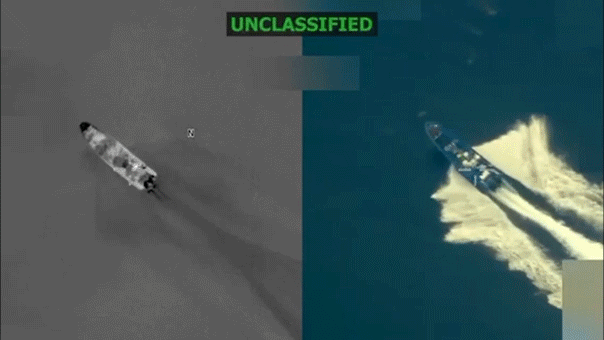President Donald Trump recently announced a significant military action targeting a vessel linked to narco-terrorism. On his Truth Social account, Trump detailed a lethal strike carried out by U.S. forces against a ship confirmed to be trafficking illicit narcotics in the Southern Command area. The operation resulted in the deaths of three individuals identified as narco-terrorists, reflecting the administration’s ongoing commitment to combat drug trafficking and violence linked to organized crime.
| Article Subheadings |
|---|
| 1) Details of the Military Strike |
| 2) Background on Narco-Terrorism |
| 3) Implications for U.S. Foreign Policy |
| 4) Response from Venezuelan Officials |
| 5) Future Military Actions and Strategy |
Details of the Military Strike
The military operation, which took place in international waters, was initiated based on confirmed intelligence regarding the vessel’s involvement in drug trafficking. President Trump stated that the operation led to the deaths of three male narcoterrorists aboard the ship. The President emphasized that no U.S. forces were harmed during the strike, highlighting the effectiveness and precision of the military operation.
According to Trump’s announcement, the vessel was traveling along a known narcotrafficking route, en route to supply narcotics within the United States. The President expressed the urgency of combatting illegal drug sale activities that pose significant threats to American society. This military move marks a significant escalation in the ongoing battle against drug trafficking in the region.
Background on Narco-Terrorism
Narco-terrorism refers to the use of drug trafficking to finance illegal activities that often include violent crimes and terrorism. This issue has gained international attention, particularly as organized crime syndicates like the Sinaloa Cartel and Tren de Aragua have expanded their influence and operations. These groups exploit weaknesses in law enforcement and governance, creating insecurity in affected regions.
The Trump administration has been active in labeling certain drug cartels as foreign terrorist organizations, thus opening pathways for more aggressive military and law enforcement actions against them. In February, the administration specifically designated groups such as Tren de Aragua and the Sinaloa Cartel as threats to U.S. national security, intensifying the focus on dismantling their operations through both diplomatic and military means.
Implications for U.S. Foreign Policy
The recent military strike represents a pivotal moment in U.S. foreign policy regarding narcotics and terrorism. It signals a calculated approach to address threats that extend beyond American borders and impact domestic safety. The commitment to combat drug trafficking in a proactive manner resonates with Trump’s administration’s strategy of employing military force as a deterrent against organized crime in Latin America.
By taking military action against designated terrorist organizations, the administration aims to deter future trafficking activities while also reassuring American citizens of its commitment to national security. This may further influence relations with Latin American nations, potentially fostering greater cooperation with allies who share similar concerns regarding narco-terrorism.
Response from Venezuelan Officials
The military actions have sparked a swift and intense reaction from Venezuelan officials, who decried the strikes as violations of sovereignty. President Nicolas Maduro condemned the U.S. operations, labeling them as aggressive acts that threaten regional stability. In press conferences, he has labeled the military escalation as a “threat” against Venezuela, further straining U.S.-Venezuela relations.
Maduro’s government has highlighted the complexities of regional politics, pointing out that these military actions could unintentionally escalate tensions or lead to retaliatory measures. The situation could serve as a rallying point for anti-U.S. sentiments in the region, complicating the delicate balance of international relations in South America.
Future Military Actions and Strategy
Looking ahead, the U.S. military appears to be prepared for additional actions against narco-terrorist organizations. Trump has hinted at sustained military engagement aimed at dismantling not only the cartels but also the networks that support them. This may involve increased surveillance, intelligence sharing, and coordination with regional allies.
Moreover, military experts suggest that continued strikes will serve as a message to drug cartels that their operations will not be tolerated. This initiative could broaden to include diplomatic efforts aimed at securing cooperation from Central and South American nations in the fight against drug trafficking. The potential for further strikes remains a critical focal point for U.S. national security interests, emphasizing a commitment to a robust response against international drug trafficking.
| No. | Key Points |
|---|---|
| 1 | Trump ordered a military strike against a vessel involved in narcotrafficking. |
| 2 | Three narco-terrorists were killed during the operation, with no U.S. casualties. |
| 3 | The strike is part of a broader U.S. strategy to combat drug-related terrorism. |
| 4 | Venezuelan officials declared the strike as an infringement on national sovereignty. |
| 5 | Future military actions are anticipated as part of a sustained counter-narcotics strategy. |
Summary
The military strike ordered by President Trump represents a significant escalation in the U.S. response to narco-terrorism, particularly as it pertains to operations involving Venezuelan drug cartels. This action underscores the administration’s commitment to addressing the threats posed by organized crime and drug trafficking on both national and international fronts. As the situation evolves, the implications for foreign policy and regional stability remain critical considerations for U.S. leadership.
Frequently Asked Questions
Question: What prompted the military strike against the drug vessel?
The military strike was prompted by intelligence indicating that the vessel was involved in narco-trafficking, specifically targeting illicit drugs intended for American markets.
Question: What was the outcome of the strike?
The outcome of the strike resulted in the deaths of three male narcoterrorists aboard the vessel, with no U.S. forces being harmed during the operation.
Question: How has Venezuela reacted to the U.S. military actions?
Venezuelan officials, including President Nicolas Maduro, condemned the actions as violations of national sovereignty and aggressive threats to regional stability.
